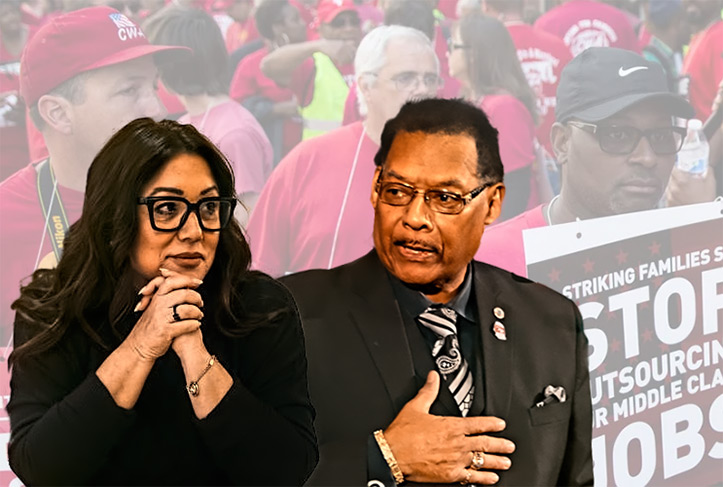
THE PRO-UNON LABOR SECRETARY SELECTION – President-elect Trump’s pick of Lori Chavez-DeRemer as Labor Secretary shocked many business owners, especially in the communications infrastructure industry, who are antithetical to collective bargaining. Many unions are supporting her nomination. Although Communications Workers of America (CWA) President Claude Cummings Jr. hasn’t commented on Chavez-DeRemer, CWA issued a press release on Saturday supporting her, stating: “We are counting on her to hold the line for working people and reject attempts by anti-worker extremists in the Trump administration and Congress to enact Project 2025 and endanger workers’ livelihoods and lives.” CWA members will benefit from the heavily weighted union requirements in the $42.5B BEAD program, an area that Senator Ted Cruz wants to trim and Chavez-DeRemer might be reluctant to support.
President-elect Donald Trump announced Friday his plans to nominate Oregon Rep. Lori Chavez-DeRemer to head the Labor Department, a post that requires Senate confirmation.
“Lori’s strong support from both the Business and Labor communities will ensure that the Labor Department can unite Americans of all backgrounds behind our Agenda for unprecedented National Success – Making America Richer, Wealthier, Stronger, and more prosperous than ever before!” Trump said in a statement.
Chavez-DeRemer’s selection represents a break for Trump, who has typically chosen pro-business leaders to head the department. Tapping her for the role has shocked many employers.
During his 2024 campaign, Trump courted working-class voters and union workers by pledging to revive America’s manufacturing sector through tariffs on foreign companies, tax cuts for workers, and higher wages driven by increased U.S.-based manufacturing.
Although these efforts failed to secure endorsements from most unions or a majority of union households in the 2024 election, Trump has gained traction with rank-and-file union members. Notably, his announcement of Chavez-DeRemer’s nomination made no mention of her pro-union stance.
Chavez-DeRemer leans toward unions
Chavez-DeRemer is considered pro-union. As a Republican, she has taken several positions that align with labor interests:
Chavez-DeRemer is one of the few Republicans who co-sponsored the Protecting the Right to Organize (PRO) Act, legislation to strengthen workers’ unionization rights.
Her nomination has received backing from major labor organizations, including the Teamsters Union and the American Federation of Teachers. Teamsters President Sean O’Brien praised her support for workers’ rights.
If confirmed, Chavez-DeRemer would follow Biden’s first Labor Secretary, Marty Walsh, a longtime union leader, and acting Labor Secretary, Julie Su — the former California labor secretary and commissioner, as well as a former labor attorney — in the role.
Independent contractor rule: A critical test for Chavez-DeRemer
One of the most anticipated decisions under Chavez-DeRemer’s leadership will be the approach to the federal independent contractor test. The Biden administration’s rollback of a Trump-era rule made it harder for businesses to classify workers as independent contractors. Many expect the Trump administration to restore a more flexible standard favoring businesses.
However, Chavez-DeRemer’s union-friendly record raises questions. She previously supported the PRO Act, which proposed a strict “ABC” test similar to California’s, making contractor classification more difficult.
The CWA says Chavez-DeRemer must hold the line for working people
The Communications Workers of America (CWA) said that Chavez-DeRemer has shown that she understands the importance of labor union membership and the right to collectively bargain. They previously endorsed Kamala Harris for President and have generally leaned Democratic in their political endorsements and activities. The union often aligns with the Democratic Party because of shared priorities like workers’ rights, collective bargaining, and economic policies to reduce income inequality.
In Congress, Chavez-DeRemer voted against measures that would have reduced funding for the Department of Education and opposed school vouchers, positions that align with many labor unions’ priorities.
These actions indicate her pro-union stance, distinguishing her from many Republican colleagues.
Some political observers believe her union advocacy might put her at odds with Senator Ted Cruz, who will try to reduce union requirements in the $42.5B BEAD funding program.
The CWA has opposed Republican-led deregulation efforts in the telecommunications sector, which it argues undermine workers’ rights and job security.
She’ll influence the selection of the next OSHA chief
Although President-elect Trump will appoint the Director of OSHA, a position housed within the Department of Labor, Chavez-DeRemer’s influence on workplace safety policy is expected to be significant. She will likely have the ear of the Trump transition team in selecting the next OSHA leader. Considering her union backing, it’s anticipated that the nominee may have a moderate or even union-friendly record.
Chavez-DeRemer’s leadership will likely lead to finalizing a workplace heat standard in 2025, possibly in a scaled-back form incorporating employer perspectives.
Last month, NATE: The Communications Infrastructure Contractors Association advocated for wireless workers’ concerns that some safety measures, such as mandatory breaks during high-temperature days, are not feasible for tower crews responsible for climbing and maintaining communications facilities at height.
Renewed overtime rule likely – but less dramatic

Although a federal judge recently blocked a new overtime rule that was supposed to be in effect January 1, 2025, which would have transferred $1.5B to workers in overtime pay, the legal landscape could shift with support from Chavez-DeRemer.
Where could the Secretary of Labor have a significant impact? Wage and hour law is a top contender, particularly the overtime rule. While a federal judge recently blocked the new overtime rule from taking effect on January 1, 2025, keeping the salary threshold at $35,568, the landscape may shift under Chavez-DeRemer.
Initially, a Trump-led DOL was expected to scrap or significantly scale back the Biden-era salary threshold increase. However, Chavez-DeRemer’s nomination adds a new dynamic.
The recent federal court decision on November 15, 2024 that struck down Department of Labor overtime exemptions nationwide has significant implications for employers navigating federal and state overtime exemption requirements. The decision halts the federal minimum salary requirement increase under the Fair Labor Standards Act (FLSA) and underscores the growing prominence of state-level standards.
Employers should take note of these changes and their implications for 2025. ADP published an updated minimum salary requirement for overtime exemptions in 2025.


















